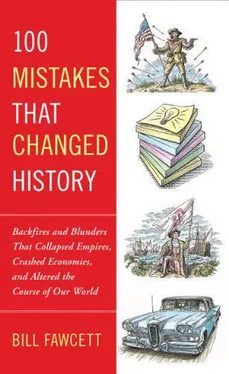The mistake made by Admiral Kimmel and General Short was not to be prepared. Another was to ignore the intelligence they had been given. If the American Pacific surface fleet had not been effectively neutralized on December 7, 1941, then the Japanese expansion and successes in 1942 might well have been much less. The Philippine Islands might have been successfully reinforced, and so no Bataan Death March. But the mistake was made, and for the next year, the Japanese expanded without real resistance until they occupied much of the Pacific Ocean and were threatening Australia itself. These two commanders, who resigned on December 8, had the most important American bases in the Pacific on low alert. With war expected any moment, it was a mistake that cost thousands of lives and changed the nature of the war in the Pacific. There certainly was an intelligence failure, and it was the intelligence of those who had been in command.
77. SELF-DEFEATING VICTORY
Pearl Harbor Redux
1941
The Imperial Japanese Navy’s December 7, 1941, surprise attack was not only an intelligence and tactical disaster for the United States; it was also the worst strategic action taken by Japan in all of World War II. To understand this you have to look at why Japan went to war against the United States. There was never a thought in Tokyo that Japan could actually defeat and conquer the much richer and more populous North America. From the beginning, the intention was to force the United States into a peace agreement on Japan’s terms. Those terms were, generally speaking, designed to leave Japan in control of Southeast Asia and a sphere of islands in the Pacific.
But remember that before the Pearl Harbor attack there was no state of war between America and Japan. Nor were there any American plans in motion to start a war. The United States was protesting diplomatically the Japanese treatment of China and had cut off oil and scrap metal shipments, but that was very far from declaring war. President Roosevelt was on record as wanting the country involved in the war, but he wanted involvement in the war in Europe, not in the Pacific. Even after the attack on Pearl Harbor the president pushed for and ensured that the U.S. war effort was concentrated on Europe.
It has often been maintained that Japan was sure its attacks on British and French territories in Indochina would bring the United States into the war, but that was hardly a guaranteed response. The strong isolationist feeling the majority of Americans held kept the country out of war while France itself fell, the Battle of Britain was fought, and the Nazi invasions of Norway and other neutral countries came about. It was far from definite that invading Vietnam and Burma was going to force America to defend the colonies of nations that America had not gone to war to defend when the homelands were attacked. So the very basis of claiming there was a need for an attack on the United States was and is questionable.
What the surprise attack in Hawaii did create was a diplomatic disaster that should have been easily foreseen. After all, a beneficial negotiation was the goal, with Japan dictating from strength, but to have that, the other party has to be willing to negotiate. And this was only to get the United States to accept Japan’s extended conquests on the other side of the world. So here is the mistake. In an attempt to force the Americans to make a beneficial treaty with Japan, they started a war in a way that was guaranteed to enrage virtually every American. Its actions in attacking Pearl Harbor pretty much guaranteed that no moderate compromise with the United States would ever be possible.
If you want to reach an agreement with someone you are arguing with, then sucker punching him or her is probably not the best technique. Worse, the attack had a second effect, having aroused the need for revenge in a nation with ten times the industrial capacity; the Japanese were forced to push hard for some sort of dramatic victory. Having angered an industrial giant, they had to win fast. This then forced the Japanese into aggressive and eventually militarily disastrous battles such as those on the Coral Sea and at Midway. But no matter how many battles the Imperial Japanese Navy won, from the beginning, forcing such a negotiated victory was no longer possible. The American public simply would not have accepted one. Nor would that always “decisive victory” have been decisive. The U.S. Navy was able to make up all its losses from Pearl Harbor and go on to become a force that put hundreds of warships off Okinawa just a few years later. Unless the American morale broke, and there was little chance of that after what President Roosevelt described in his radio announcement of the attack as “a day that will live on in infamy,” not one or even several naval victories could force the peace Japan started the war to obtain.
War is often said to be an extension of diplomacy. Yet by attacking Pearl Harbor before war was declared, the Japanese instead excluded diplomacy as a means of resolution. It was a mistake they paid dearly for making.
Double Betrayal
1941
On December 7, 1941, the Japanese attacked Pearl Harbor and started a war with the United States. The wisdom of that decision was itself dubious, but the mistake made by Adolf Hitler a few days later easily equaled it in dire consequences. It had been a good year for Hitler and the Third Reich. The German army had conquered most of Europe and the only setbacks had seemed minor. The British had managed to repel the air offensive and so avoid an invasion of their island. In Africa, Erwin Rommel had been stopped short of Cairo in what was really a minor sideshow. The war with Russia had gone brilliantly with almost 2 million Russian soldiers killed or captured and vital parts of that country occupied. For years, Hitler had cultivated the Japanese leadership in expectation that Japan would attack Siberia, providing a second front against Russia. The German foreign minister, since Operation Barbarossa, had suggested to Japan that mineral-rich Siberia was theirs for the taking. Hitler personally had seen the damage having to fight on two fronts did in World War I to Germany. He was anxious for Russia to suffer the same fate.
When Adolf Hitler heard about Pearl Harbor, he was recorded as being visibly happy. Based on what he did next, there must have been an expectation that Japan, who had already declared themselves an ally of Germany and Italy, would join in attacking Russia. What he did not know was that months earlier the Japanese had decided to concentrate on the United States and had no interest in attacking Russia. Worse for Germany was the fact that Russia had been informed of this by a spy in Tokyo. This security breach served both Japan and Russia well. It allowed Stalin to begin pulling the elite Siberian battalions west immediately after the Germans invaded. With most of the Russian divisions gone, Japan did not need to station significant forces on the Russian border either. By October 1941, the Russians and Japanese had actually signed a nonaggression pact. The loser was Germany. But four days after Pearl Harbor, on December 11, Adolf Hitler declared war on the United States in support of Japan. That he did so based on a false assumption is clear from his remarks at the time. He expected Japan to attack Russia. Also, after seeing the effect American units had when they finally joined in the Great War, he certainly wasn’t anxious to see them in Europe again. It was his expectation that Japan would distract America, leaving Germany free to complete what seemed to be the inevitable conquest of Russia and to force a peace on Britain. Of course that was not how it worked.
Читать дальше












